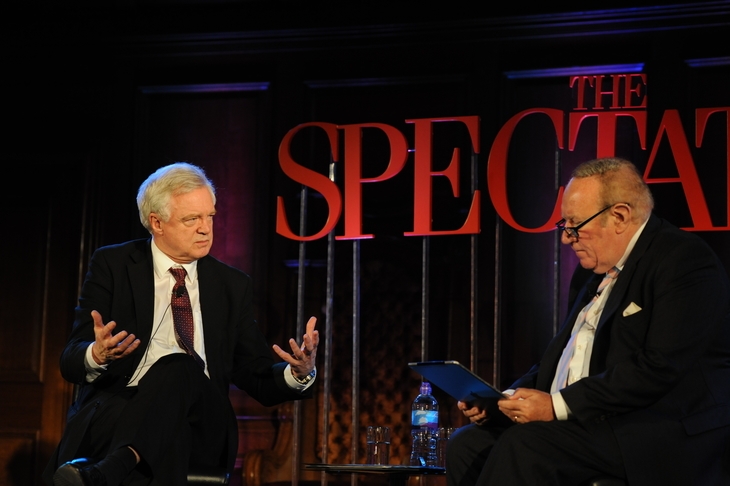With a year and a day to go to Brexit, David Davis sat down for an interview with Andrew Neil this evening. Davis was clear that there wouldn’t be a deal, and thus a £37bn payment to the EU, unless there was an agreement on the future relationship too.
Contrary to the received wisdom, David Davis told this special Spectator event that the UK and the EU will ‘get pretty substantively close’ to a free trade agreement by October. He argued that this meant that the withdrawal agreement would have a lot of detail on what the future trading relationship would be. He said that he thought that this would be necessary to get it – and permission to pay the EU £37bn – through parliament.
There were, though, reminders of how far apart the UK and the EU are on this FTA. Davis told Andrew Neil that the ‘big fight’ wouldn’t be over tariffs, where both sides were pretty much agreed that they didn’t want them, but standards. He said that he expected the UK would ‘get pressure’ to agree to a floor for corporate taxes, but was determined to stand firm. He candidly admitted that the UK’s position on financial services’ access to the EU market was ‘we want as much as we can get’.
Ireland is, obviously, another source of disagreement. David Davis said that Boris Johnson wasn’t right that the Irish border issue was being used to try and keep the UK in a customs union with the EU. But he emphasised that the UK believed that the high alignment’ referred to in the December joint report referred to outcomes, not harmonisation. The EU, as its draft legal text makes clear, takes the opposite view.
Interestingly, Davis, quite deliberately, wouldn’t rule out preferential treatment for EU citizens when it came to the right to work in the UK as part of the Brexit deal. It is becoming ever clearer that this is one sweetener that the government is prepared to throw in to get a better deal.
Understandably, lots of the discussion on Brexit focuses on the economics of it. Davis argued this evening that entrepreneurs ‘who can see the future’ are keener on it than established business in ‘steady-state’ sectors of the economy who tend to favour the status quo. But the Brexit Secretary pointed out this evening, his vote to Leave wasn’t based primarily on economics but on ‘self-determination’. The ultimate test of the Brexit deal that the government is negotiating is whether it can deliver that and do so in a way that is compatible with sustained, long-term economic growth.







Comments